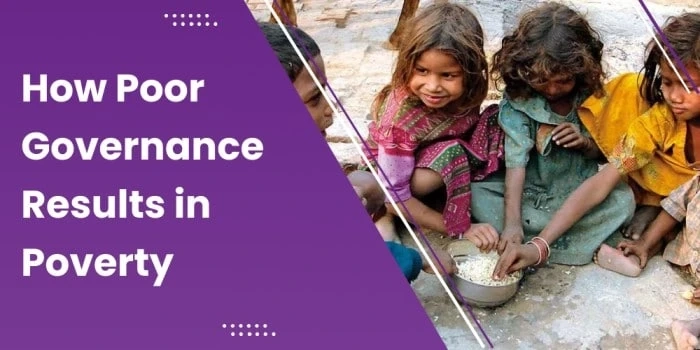Good governance is crucial for a nation’s efforts to root out poverty. Across the world, there are many emerging and developing countries which have managed to reduce poverty while promoting economic growth and development. Most notably, China has managed to lift millions out of poverty, while emphasizing manufacturing and services to boost growth and employment.
On the other hand, there are still many countries that are struggling to provide the basic necessities of life to large parts of their population. These least developed countries, mainly in sub-Saharan Africa, face mounting challenges from corruption, armed conflict, weak governance, climate change, and many others. Some countries are dependent on foreign aid, which they get from the West or international institutions to help people in need.
Though these governments have social security and poverty alleviation schemes in place, many a time the actual beneficiaries do not get the benefit of these schemes, as corruption eats away all the funds or resources.
When we say poor governance, most of us relate it to corruption. However, there are other reasons for this.
Causes of Poor governance
Corruption
The main cause of poor governance, many government and non-governmental employees do not see corruption as a sin. They openly ask for bribes to get everything done- from registering a birth to awarding multi-million dollar poverty alleviation contracts. Due to red tape and corruption, there is an unfair distribution of resources amongst the hands of a few while the rest languish in poverty. Even if a country has the means to help its poor, hoarding of resources via corrupt practices actually increases poverty.
Institutions
Every government has institutions that are supposed to implement the rule of law to govern society. In many developing countries, these institutions work for the vested interests of a few and do not implement laws and rules they are supposed to implement.
Investment
The cause is also the effect here. Poor governance and political instability discourage foreign investments in a country’s development. Poor law enforcement drives away investors from developing the country’s infrastructure, industry, agriculture, or services. Investors are worried about facing delays and losses if their investments are threatened by red tape, conflict, or other local challenges. Before investing, investors expect the local government to ensure peace, adherence, and strict implementation to local laws besides other basic law and order conditions. Due to vested interests, most third-world countries are not able to develop their governments according to the investors’ requirements.
External Aid
Earlier, many international donors used to give aid in the form of funds or resources to governments for further distribution to the poor. When they realized that their external aid was lining the pockets of the elite, they started establishing institutions within the country to distribute resources. Unfortunately, here too, many local employees siphoned off funds under various pretexts, rendering the aid useless.
To ensure this does not happen, many organizations working to feed the hungry have started to put in measures to ensure there is no corruption while working on the ground.
How the poor suffer the most due to political instability
In the least developed countries, most of the control over resources is concentrated in the hands of a few. Many a time, they fight amongst themselves for control over resources, resulting in political instability, poor governance, corruption, and red-tapism.
Though the winner or loser of the battle between the elites is another question, the poor suffer the most here. As the elites are squabbling over resources, it is the poor who have to struggle to make ends meet. Even when poverty can be eradicated with the efficient distribution of resources, political instability doesn’t allow this to happen. Many times, this instability goes on for years.
Lastly
When it comes to the question ‘How to end poverty?’- the only solution that comes to mind is by doing something on your own and not depending on others. That’s what many Catholic institutions do by serving the poor in the least developed countries of the world.
0



